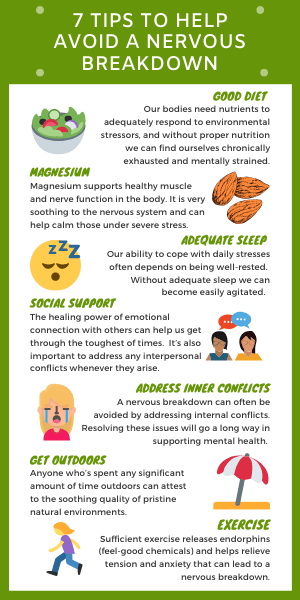7 Things to Try During a Nervous Breakdown
Select a Topic
Living a balanced life—emotionally, physically, psychologically—can be challenging in these fast-paced times. The amount of distractions, from social networking to email, can leave us frazzled and over-extended. If you feel a nervous breakdown may be a possibility, keep in mind properly dealing with stress is key. Here are 7 helpful tips on managing stress so that a breakdown never becomes an issue.

1. Good Diet
The importance of nourishing your body cannot be overestimated in preventing and coping with stress. Our bodies need nutrients to adequately respond to environmental stressors, and without proper nutrition we can find ourselves chronically exhausted and mentally strained. Add to this a high intake of caffeine and you’ll be left feeling depleted over time. Avoid processed foods and seek out high quality proteins, fruits and vegetables (preferably organic as pesticides and herbicides found on conventional produce place a toxic burden on the kidneys and liver) and whole grains. The probiotic bacteria in fermented foods like sauerkraut, yogurt and kimchi (homemade and raw as commercial products are usually pasteurized and highly processed) have been shown to have a beneficial effect on mood as well!1
2. Magnesium
Did you know 75-80% of Americans are deficient in magnesium?2 This very important mineral is responsible for the activation of more than 300 enzymes in the body. Due to modern farming methods, soil depletion and poor diet, many of us are lacking in this vital mineral. Magnesium supports healthy muscle and nerve function in the body. It is very soothing to the nervous system and can help calm those under severe stress. Without it, people become tired, anxious and irritable. Stress itself also depletes magnesium levels, causing further nervous tension3. Excessive coffee drinking, in addition to causing anxiety, can exhaust the body’s magnesium supply4. Whole grains, Pumpkin seeds, Brazil nuts, almonds, cooked spinach and Halibut are all great sources of magnesium.
3. Adequate Sleep
We’ve all been sleep-deprived at one point or another and the effect it has on our day can be profound. Our ability to cope with daily stresses often depends on being well-rested. Without adequate sleep (most adults need 7-8 hours of deep, quality sleep a night), we can become easily agitated. Stress levels rise and our immune system suffers. Make sleep a priority and your capacity to deal with daily pressures will be greatly enhanced.
4. Social Support
Having a community where you feel comfortable sharing your thoughts, hopes and dreams is very important. In a time when people are becoming increasingly isolated, family and friends are a critical safety net in dealing with life’s challenges. The healing power of emotional connection with others can help us get through the toughest of times. Overcoming social anxiety is key to this process. It’s also important to address any interpersonal conflicts whenever they arise. Practice forgiveness. The act of forgiving someone and letting go of offense is an essential part of staying healthy and happy long-term.
5. Address Inner Conflicts
A nervous breakdown can often be avoided by addressing internal conflicts. Anger, frustration, lack of forgiveness—ignoring these indefinitely can have disastrous results. Resolving these issues will go a long way in supporting mental health. Perhaps consider visiting a counselor or psychologist to work out these conflicts or issues relating to depression. Don’t be hard on yourself. Practice forgiveness with yourself as much as you do with others.
6. Get Outdoors
Our isolation from nature as a culture is a very new phenomenon. For most of human history, people have lived integrated with and connected to the natural world. Modern research has shown that getting out into natural environments can have positive effects on mental health5. Anyone who’s spent any significant amount of time outdoors can attest to the soothing quality of pristine natural environments. So take some time to simplify. Turn off the smartphone, tune out the distractions and find a natural area near you.
7. Exercise
No discussion of stress-reduction techniques would be complete without mentioning exercise. Sufficient exercise releases endorphins (feel-good chemicals) and helps relieve tension and anxiety that can lead to a nervous breakdown. Whether that’s cycling, jogging, rebounding (a rebounder is a mini-trampoline) weight-lifting, club-belling or walking in the park—find a consistent exercise routine that works for you. Start small, make incremental changes, and soon you will find yourself enjoying a much healthier, happier life.
References
- A randomized, double-blind, placebo-controlled pilot study of a probiotic in emotional symptoms of chronic fatigue syndrome. GUT PATHOGENS. Vol 1, Num 1, 6. 19 Mar 2009. DOI: 10.1186/1757-4749-1-6
- Jaffe R MD. “How to Know if You are Magnesium Deficient: 75% of Americans Are” (transcript), 06/16/05, www.innovativehealing.com
- Galland L. “Magnesium, Stress and Neuropsychiatric Disorders”
- "Medical Hypotheses"; The Multifaceted and Widespread Pathology of Magnesium Deficiency; S. Johnson; 2001
- American Psychological Association. Clay R. “Green is good for you” 04/2001 www.apa.org/monitor/apr01/greengood.aspx